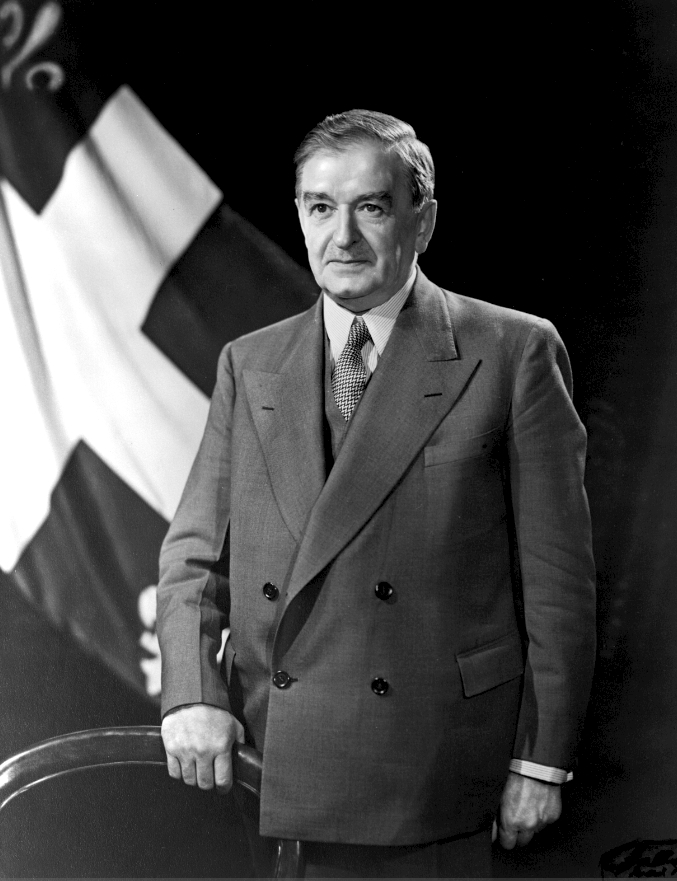 Hello all, today I wanted to talk about a book I had to read in History of North American Religion entitled La Guerre, Yes Sir! by Roch Carrier (author of the short story "The Hockey Sweater"). It is the darkly comedic story of when the body of a dead French Canadian soldier is returned to his home village in rural Quebec. Chaos is unleashed when Anglo soldiers arrive with the body the villagers arrive to pay their respects, bringing drinking, shouting and fighting in their wake. Carrier's novel lampoons the classic view of Quebec identity since of being largely rural and pious, something politicians like Maurice Duplessis had been emphasising during the 1930s and '50s under the power of the Union Nationale. La Guarre, Yes Sir! is not only a commentary of life during the reign on Maurice Duplessis, but is also a glimpse into Quebec society during the Quiet Revolution.
Hello all, today I wanted to talk about a book I had to read in History of North American Religion entitled La Guerre, Yes Sir! by Roch Carrier (author of the short story "The Hockey Sweater"). It is the darkly comedic story of when the body of a dead French Canadian soldier is returned to his home village in rural Quebec. Chaos is unleashed when Anglo soldiers arrive with the body the villagers arrive to pay their respects, bringing drinking, shouting and fighting in their wake. Carrier's novel lampoons the classic view of Quebec identity since of being largely rural and pious, something politicians like Maurice Duplessis had been emphasising during the 1930s and '50s under the power of the Union Nationale. La Guarre, Yes Sir! is not only a commentary of life during the reign on Maurice Duplessis, but is also a glimpse into Quebec society during the Quiet Revolution.The idea of rural Quebec being separate from its urban counter is quickly thrown away early in the beginning of La Guerre. The introduction of the railroad means the village is now dependent on the both the city and the rest of Canada by providing them with goods not normally found in in the country. It is also through the railroad that the body of the dead soldier Corriveau is brought home from the battle fields of Europe. Carrier is showing that the rural Quebec is dependent on industry as it assists the countryside by giving it the supplies that it has become reliant on and also serving as the only means to bring Corriveau's body home for burial. Despite this contact with the outside world. The village is still ignorant to what is really out there, even claiming at one point that young men would turn into homosexuals from visiting the city (149).
Religion is seen as only casually observed by French Canadians. The finest examples of this can be found in the interactions between Arsène and his son Philibert, the two being constantly at odds due to Philibert being an atheist. Throughout the book, Philibert makes blasphemous comments, prompting his father to beat him. After hearing his son make a comment about the hard ground and Jesus Christ, Arsène proceeds to hit his son until he hears Philibert mention that kicking him will be pointless as he is just reminded how happy he will be to bury his father when Arsène dies. The two then go on to compare the ground to a knot in the crucifix and the Pope’s mattress. These scenes show the lose the influence of religion was in rural Quebec. Philibert is a staunch atheist, constantly rubbing against his father’s Catholic faith. But upon realizing that his son is now a grown man, Arsène becomes willing to join in with his son’s blasphemous remarks, showing that he too is not as serious in his faith as he had appeared.
In conclusion, Roch Carrier's book is an excellent source on not only what life was like during the government of Maurice Duplessis, but also on the mind set of those viewing the past during the Quiet Revolution of the 1960s. The growth of industry in the early twentieth century had opened access between rural and urban Quebec. These two formerly separate worlds were now able to interact, though the rural part was still ever cautious of the urban. In addition, religion was not as strongly observed as believed as some villagers were willing to forsake their faith in the name of good humour. The question that now remains is how does this all play into the Quiet Revolution's perception of the past. It shows that 1960s Quebec was beginning to see its past as exactly what it was: the past. Rather than trying to up hold values that their forefathers obviously couldn't do themselves. Therefore, Carrier's books is an interesting read for how he uses dark humour to lampoon the past.
 |
| Maurice Duplessis (1890-1959) |
Bibliography
Carrier, Roch. La Guerre, Yes Sir! In La
Guerrer Trilogy, by Roch Carrier, trans. Sheila Fischman, 105-203. Toronto:
House of Anansi Press Inc., 2013.
"La Guerre, Yes Sir!" Goodreads. Accessed June 22, 2015.
"Révolution Tranquille Et Démocratie Au Pluriel." - Articles. Accessed June 22, 2015.
No comments:
Post a Comment